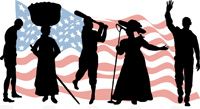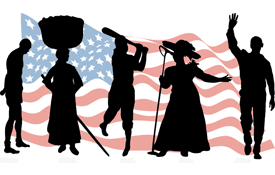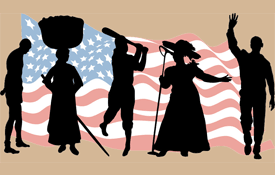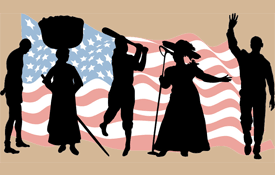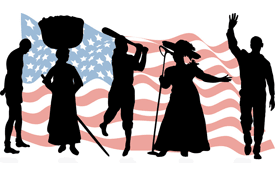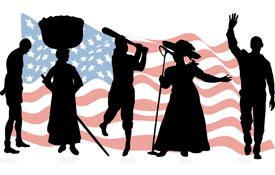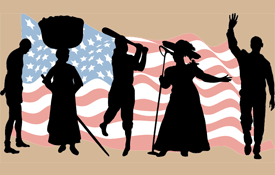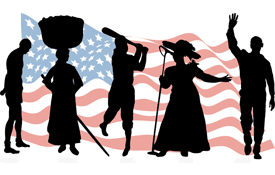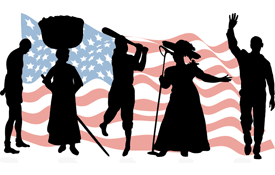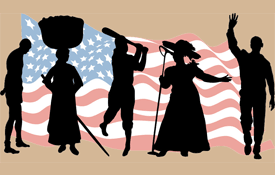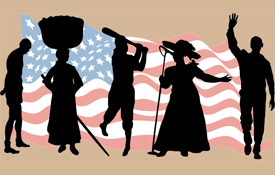Categories
-
0 A Graphic History of African Americans
- History
- by Hugh Smith
- 02/13/2009
Over 200 pages spanning 400 years of intriguing stories captures your attention in Still I Rise: A Graphic History of African Americans. Graphic in this case stands for illustrated and honest, as author Roland Laird tells the real story of African Americans from the dawn of slavery to the present. I traveled to Trenton, New Jersey to talk with Roland face-to-face about the creation of Still I Rise and the unique angle governing the presentation of this book. Watch the video interview to discover much more. You can reserve your copy of Still I Rise: A Graphic History of African Americans.
-
0 100 Years of the NAACP 1909 – 2009
- History
- by Hugh Smith
- 02/03/2009
The birthday party will last one year, and it starts on Thursday, February 12, 2009. 1,700 chapters across the USA will celebrate the 100th anniversary of the NAACP through February 12, 2010. Here is the official NAACP 1909 - 2009 timeline prepared by the National Associated for the Advancement of Colored People. A century of tenure is behind their 100 year advocacy as a leader in the fight for civil rights, dignity, and equality. Check out our own BlackHistoryPeople.com timeline featuring 15 NAACP facts (from Empower Encyclopedia): W.E.B. Du Bois was a co-founder of the NAACP in 1909. James Weldon Johnson, (1871-1938), wrote the famous poem, "Lift Every Voice and Sing" - now known as the Negro National Anthem. He joined the NAACP in 1916, and became Executive Secretary of the organization in 1920. Mary McLeod Bethune (1875 - 1955) was a champion for education, civil rights, and women's rights. She worked closely with the NAACP, and founded the National Council of Negro Women in 1935. An activist for civil rights and education, Daisy Bates co-founded Arkansas' State-Press Newspaper. In 1953, she was elected President of the Arkansas Conference of NAACP branches. Dr. Joel E. Spingarn introduced the Spingarn Gold Medal in 1914 while he was Chairman of the Board of the NAACP. The Spingarn award represented the highest of African American achievement, (similar to the NAACP Image Awards today). Attorney Constance Baker Motley, (1921 - 2005), started her brilliant civil rights career with the NAACP Legal Defense Fund in 1945 as a law clerk. Daisy Lampkin, (1883-1965), increased the visibility and membership of the NAACP through her fund raising leadership. She was involved in Pennsylvania State politics (1928) becoming the first African American woman from the commonwealth elected as a delegate at large to the GOP convention. Lampkin began her career with the NAACP in 1929, serving the organization in numerous leadership roles. Thurgood Marshall, (1908-1993), became assistant special counsel for the NAACP in 1936, then chief counsel in 1938. Dr. Martin Luther King Jr., (1929 - 1968), organized the Montgomery bus boycott with Rev. Ralph David Abernathy and the NAACP in 1955 after Rosa Parks refused to surrender her bus seat to whites. In the 1960's Vernon E. Jordan Jr. was quite involved with civil rights as Field Secretary for Georgia's NAACP. Margaret Bush Wilson was elected Chairman of the Board of the NAACP in 1975. Benjamin L. Hooks, in 1977, succeeded Roy Wilkins to become Executive Director of the nation's top civil rights organization, the NAACP. Kweisi Mfume entered the U.S. House of Representatives in 1987. He served until the end of the 104th Congress. After Congress, Mfume accepted the position of President and CEO of the NAACP. An outspoken critic of offensive lyrics by music industry artists, Philadelphia native C. Delores Tucker, (1927 - 2005), served as Vice President of the Pennsylvania NAACP. Dr. Fredda Witherspoon, Ph.D., was President of the Missouri NAACP.
-
0 25 Innovative & Original Black History Champions
- History
- by Hugh Smith
- 02/20/2008
From the digital pages of Empower Encyclopedia(c) 1998 - 2008, here are 25 innovative and original black history champions from A - M. There are many more of course, but this time, we shine the beacon on these 25: Dr. Sadie Tanner Alexander - The first Black woman Ph.D. in the United States (Doctorate in economics from the University of Pennsylvania, 1921). Guion Stewart Bluford Jr.- First African American astronaut (in space) aboard the space shuttle Challenger on August 30, 1983. Justice Jane M. Bolin - America's first African American woman judge, appointed to the Court of Domestic Relations in New York City by Mayor Fiorello LaGuardia on July 22, 1939. Thomas Bradley (1917-1998) - First African American elected Mayor of Los Angeles in 1973. Ensign Jesse Brown - First black aviator in the U.S. Navy in 1948. Jill Brown - First black woman accepted for pilot training by the U.S. Navy in 1974. In 1978, she became the first African American female pilot/First Officer with a major carrier: Texas International Airlines. Dr. Ralph J. Bunche - First African American to win the Nobel Peace Prize (1950). Yvonne Brathwaite Burke - First woman elected chair of the Congressional Black Caucus (1976). Sergeant William H. Carney - First African American awarded the Congressional Medal of Honor. Gwendolyn B. Cherry, (1924-1979) - First African American woman elected to the Florida Legislature (1970). Nathaniel Sweetwater Clifton - First African American to play in the National Basketball Association (1950 with the New York Knicks). Bessie Coleman, (1892-1926) - First black woman in the United States to receive a pilot's license. Ernie Davis, (1940-1963) - First African American to win the Heisman Trophy (1961 as a football half-back with Syracuse University). Dr. Charles R. Drew, (1904-1950) - Founded the first blood bank (1940). Lelia Foley - First African American female mayor in America (Taft, Oklahoma, April 3, 1973). W. Wilson Goode - First African American elected Mayor of Philadelphia, Pennsylvania (sworn in on January 2, 1984). Patricia R. Harris, (1924-1985) - First black woman to hold a top cabinet post (Secretary of Housing and Urban Development (HUD) under President Jimmy Carter in 1977). Judge William H. Hastie, (1904-1976) - First African American U.S. federal judge... and the youngest at age 32 (1936). Matthew A. Henson, (1866-1954) - First explorer to reach the North Pole on (April 6, 1909). General Daniel "Chappie" James Jr. - First African American (Air Force) to obtain the rank of full four-star General (1975). Hazel W. Johnson - First African American woman (Army) to obtain the rank of General (September, 1979). William H. Lewis - First African American to hold the position of Assistant U.S. Attorney General (1911 by President William H. Taft). Autherine Lucy - First African American student enrolled at the University of Alabama in 1956. Mary Elizabeth Mahoney, (1846-1926) - First African American to graduate with a diploma in nursing (1879). Thurgood Marshall, (1908-1993) - First African American appointed to the U.S. Supreme Court (by President Lyndon Johnson in 1967).
-
0 5 African Americans who Changed the World
- History
- by Hugh Smith
- 02/04/2008
Here are 5 outstanding African Americans who made contributions during the 20th century to change our world. These 5 black history people usually rise to the top in the spotlight during black history month. 1) Dr. Martin Luther King Jr. Martin Luther King Jr. is the father of the modern civil rights movement. He was born Michael Luther King, January 15, 1929, in Atlanta Georgia. Dr. King earned his Ph.D. from Boston University in 1955 (a Doctorate in Theology). He married Coretta Scott King in 1953. The young 26 year-old Martin organized the Montgomery bus boycott with the Reverend Ralph David Abernathy and the NAACP in 1955 after Rosa Parks refused to surrender her bus seat to whites. King became the first leader of the Southern Christian Leadership Conference in 1957. By 1961, he was supporting freedom rides to integrate Southern lunch counters and rest rooms. His famous "I Have a Dream Speech" was delivered on the Washington D.C. mall in 1963. King won the Nobel Peace Prize in 1964. He was assassinated in 1968 as he was preparing to lead a labor protest march on behalf of sanitation workers in Memphis, Tennessee. 2) Rosa Parks The U.S. Supreme Court ruled in 1956 that segregation on common carrier buses was illegal. The decision was reached primarily because of the Montgomery bus boycott that lasted one year. Rosa Parks, an African American seamstress, refused to surrender her seat to a white passenger (December 1, 1955). Arrested for her act, Parks eventually found justice in the courts. In 1999, President Bill Clinton presented her with the Congressional Gold Medal, the highest honor for a U.S. civilian. 3) Thurgood Marshall Thurgood Marshall, (1908-1993), was born in Baltimore, Maryland. "Mr. Civil Rights," changed history in 1954 when he successfully argued Brown vs. the Board of Education before the U.S. Supreme Court. The Brown case outlawed segregation in schools. Marshall was educated at Lincoln University and Howard Law School. He began practicing law in 1933, became assistant special counsel for the NAACP in 1936, then chief counsel in 1938. He was the first director/chief counsel for the NAACP Legal Defense Fund (1940-1961). In 1961, President John Kennedy appointed him Second Circuit United States Court of Appeals judge. By 1965 he was appointed solicitor general in the Department of Justice. Marshall was appointed to the U.S. Supreme Court by President Lyndon Johnson in 1967 becoming the first African American on the court. Thurgood Marshall is considered the most prominent civil rights lawyer of the 20th Century. 4) Jackie Robinson U.S. Army Lieutenant and former UCLA football great Jackie Robinson (1919-1972), entered major league baseball in 1945 by signing a contract with the Brooklyn Dodgers’ farm team, the Montreal Royals. Robinson, the first ever black player at the start of the 1947 season, was one of three African Americans on the roster of a major league baseball franchise by the end of 1947 (joined by Larry Doby of the Cleveland Indians, and Henry Thompson of the St. Louis Browns). 5) Muhammad Ali Muhammad Ali, born Cassius Clay on January 17, 1942, won an Olympic gold medal in Rome as a light heavy weight in 1960. He defeated Sonny Liston in 1964 to win the heavy weight championship for the first time. Ali won the crown again in 1974 by beating George Foreman. "The Greatest" became the first in boxing history to win the heavy-weight title three times when he took out Leon Spinks in 1978. Ali refused to be drafted into the U.S. Army (he was a conscientious objector on religious and moral grounds). He was stripped of his first title in 1967.
-
0 Richard Wright’s 2008 Centennial
- History
- by Hugh Smith
- 01/09/2008
2008 is the centennial of the birth of author Richard Wright. Richard Nathaniel Wright, (1908-1960), was born on September 4, in Adams County, Mississippi. Wright was the first African American author to gain a large mainstream audience. He accomplished this by writing honestly about black inner city life. Wright spent his early years on a sharecropper farm in Natchez, Mississippi. His family moved from Natchez to Memphis, Tennessee, then to Jackson, Mississippi. As an eighth grader in 1923, he wrote The Voodoo of Hell’s Half Acre, a short story that was published in Jackson’s Southern Register (a weekly newspaper targeted towards blacks). After High School graduation, Wright returned to Memphis for a couple of years. While in the South, Southern Editor H.L. Mencken had a significant impact on Wright’s consideration of writing as a career. Wright realized through Mencken’s literary journalism that words were an effective weapon in the social struggle for equality. As a young man, Wright’s fascination with writing and literature led him to unsuccessfully attempt prose in the style of many authors he admired including Theodore Dreiser, Sherwood Anderson, and Sinclair Lewis. In 1927, Wright moved to Chicago. He got a job in the Post Office. Postal service friends who were members of the Communist Party encouraged him to join the party too. Artists, writers, and intellectuals of the day who sympathized with communism became affiliated with the John Reed Club (a group sponsored by the party). Wright joined, and had his poems published in Left Front, a John Reed Club publication (1934). In 1936, the WPA assigned him to the Federal Theater Project where he worked as a public relations writer. Late in 1936, Wright’s short story Big Boy Leaves Home appeared in The New Caravan anthology. A November 1936 review by The New York Times and The New Republic called his story the best in the collection. By 1937, Wright was in his right career as a writer. His first novel, Native Son, was published in March of 1940. The stage adaptation of Wright’s best seller opened in 1941 at New York City’s St. James Theater. John Houseman produced and Orson Welles directed. The National Urban League picketed the production expressing their dissatisfaction that "Native Son" portrayed blacks in an unfavorable light. Wright toured Brazil, Paris, and Europe in 1946. After writing 12 Million Black Voices, Wright was kept under surveillance by the FBI. By 1947, he decided to move to Paris. During the 1950’s he traveled to Africa and Indonesia. He was a Pan Africanist who refuted Africa’s arbitrary border divisions (imposed by Europeans). Wright excelled in authoring Japanese poetry, writing over 4,000 haiku poems. He died in Paris on November 28, 1960. For the 2008 Wright centennial, Harper Collins Publishers has released A Father’s Law, (on sale January 8, 2008). This unfinished and previously unpublished novel was found by Wright’s daughter Julia after his death. A Father’s Law, and Richard Wright, are great black history month projects.
-
0 Alex Haley: The Man Who Traced America's Roots
- History
- by Hugh Smith
- 05/09/2007
In honor of the 30th Anniversary of Roots, Reader's Digest has compiled a collection of outstanding Alex Haley articles written between 1954 - 1991. Alex Haley The Man Who Traced America's Roots also includes an excerpt from Roots. Race, politics, and class expert Lawrence Otis Graham introduces the book by highlighting some of Haley's accomplishments. Haley, a Pulitzer Prize-winning author, shook the conscience of America and the world when the story of his African ancestor Kunta Kinte was first published in 1976. Roots on television had an even bigger impact on millions of viewers as it humanized the story using emotional connections we all could relate to. Kunta Kinte's family story framed inside the vicious backdrop of slavery left a visual impact most people will never forget. The new book includes a fascinating 30 minute bonus DVD, with candid footage of Alex Haley talking about some of his challenges while writing Roots. Additional footage includes Malcolm X, Elijah Muhammad, and how Haley came to write about them in his Reader's Digest assignments. You'll also enjoy reading the section, "What Roots Means to Me." Halle Berry, B.B. King, Leslie Uggams, General Colin Powell, and others reflect on the impact of Roots on their lives. Audio highlights of these special comments are also included on the DVD.
-
- History
- by Hugh Smith
- 04/25/2007
The television producers of African American Lives 2 are seeking an African American to join Harvard professor Henry Louis Gates Jr. and an all-new group of distinguished African Americans tentatively scheduled to air on PBS in February, 2008. Under the supervision of Professor Gates, the series' research will be conducted by genealogists Tony Burroughs, Johni Cerny, Jane Ailes and Megan Smolenyak together with Ancestry.com, one of the world's leading online resources for family history information. The selected individual's family history will be researched and featured on African American Lives 2, while a DNA testing service will provide a genetic analysis. If you are interested, apply online at pbs.org/aalives. Online applications must be received by 6:00 p.m Eastern, Friday, May 4, 2007.
-
0 Classic Soul Tribute to Jackie Robinson
- History
- by Hugh Smith
- 04/14/2007
April 15, 2007, is the 60th anniversary of Jackie Robinson's first baseball game in the major leagues. Catch my perspective in Jackie Robinson Honored with 13 Song Tribute. I wrote this piece exclusively for the classic soul/R&B section of the new website, TBD.com. 2018 update: Unfortunately, the original TBD.com website has shut down, and I don't have a copy of the original review.
-
0 Walker, Washington, and Winfrey Capture Women's History Success
- History
- by Hugh Smith
- 03/14/2007
March, Women's History Month, is a great time to look at three African American ladies who identified specific community needs, created some valuable services, and then prospered financially from their cutting edge innovation. Madame C.J. Walker, (1867-1919), was one of the first American women to become a millionaire. Walker was also the first African American female millionaire. She created an original formula for straightening hair. Her hair ointment became an overwhelming overnight success. With just $2, the Madame C.J. Walker Manufacturing Company was born in Indianapolis, Indiana (1910). At its zenith, the Walker business empire directly employed 5,000 black women in schools, salons, laboratories, and factories. Madame Sara S. Washington, (1881-1953), was also a pioneering African American entrepreneur. She too became a millionaire by providing cosmetic and beauty products targeted toward black women. The Buckley, Virginia native launched her first beauty shop in Philadelphia, Pennsylvania. In 1920, Washington manufactured hair care and beauty preparations under the name of Apex Hair Products. She also founded various Apex Beauty Colleges. Oprah Winfrey's gateway to success: mass media, communications, and entertainment. Oprah was Nashville, Tennessee's first African American television correspondent in 1973. By 1978, she was co-hosting a local talk show in Baltimore, Maryland. After a year in the Windy City hosting A.M Chicago on WLS-TV, the program was renamed The Oprah Winfrey Show in 1985. In 1988, she launched Harpo Productions, the creative center of her many entrepreneurial activities. In the black history timeline... Madame C.J. Walker Madame Sara S. Washington Oprah Winfrey are three creative African American women who have personally reaped big financial benefits because of their direct and indirect involvement in doing something positive for their communities.
-
0 5 Black History Comics Comment Constructively using Laughter
- History
- by Hugh Smith
- 02/21/2007
Contemporaries Dave Chapelle, Chris Rock, Whoppi Goldberg, and Eddie Murphy have entertained millions with their antics, laughter, and fun. Their unique styles draw inspiration from the great comedians that came before them. When vocal African American funnymen and women observe the world, black history stories become anything but depressing. Let's take a look back, and recall 5 "old school" greats. These are the legendary crafty commanders of wit. Each fused social commentary together with entertaining quips to produce fabulous "standup" routines. 1) Comedy legend Jackie "Moms" Mabley, (1898-1975), began her career in 1923. She opened for such greats as Count Basie, Duke Ellington, Louis Armstrong, and Cab Calloway. Mabley didn't record her first album until 1960, but it turned into a gold record, generating over one million dollars in sales. She'll forever be remembered for her comedic genius. 2) Redd Foxx (1922 - 1991), was really hardcore hilarious. I was lucky enough to see him live in a nightclub setting before he became big on television (starring in Sanford and Son). If Stanford and Son was rated G, Foxx's live act was definitely rated X, (or R by today's standards). Foxx is one of the most influential comics of all time. 3) Richard Pryor (1940 - 2005), is also remembered as a comedic genius. If you listened closely to his bits, Pryor was always slipping in some gritty social commentary between the laughs. Here's one of my favorite Pryor routines: "I went to see Logan's Run right, they had a movie of the future called Logan's Run, I said well white folks ain't planning for us to be here!" 4) Dick Gregory. When I originally wrote this article, I neglected to include perhaps the strongest social activist to use comedy as a catalyst to express change. Born in St. Louis Missouri (1932), Dick Gregory is best known today as an author, nutritionist, and civil rights leader. He started his career as a comedian, and found humor in the adversity of the poverty of his youth. 5) Bill Cosby was the first African American actor to receive an Emmy Award (1966) for his role in the television series "I Spy." The Philadelphia native continues to be extremely successful as a comedian, actor, writer, producer, and critic of eubonics (loosely defined as African American jargon). Honorable mentions to Flip Wilson, Nipsey Russell, Sinbad, Jimmy Walker, Franklyn Ajaye, George Wallace, and Arsenio Hall for their contributions to black history laughter through the years. 2018 Update: Dick Gregory, (1932 - 2017).
